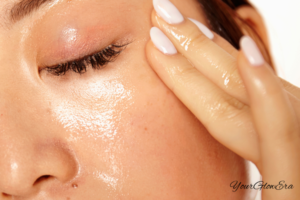If you have oily skin, you know that achieving a glowing complexion can be a bit tricky. While oily skin tends to have a natural shine, it can often lead to excess oil buildup, clogged pores, and acne breakouts.
But don’t worry! In this ultimate guide to glowing skin tips for oily skin, we’ll dive into everything you need to know to help you achieve a healthy, oil-free glow.
Whether you’re dealing with acne, excess shine, or just looking for the right skincare routine, this article has got you covered.
Glowing skin tips for oily skin are all about finding the right balance. You want to keep your skin hydrated and nourished, without overwhelming it with heavy products that might clog your pores.
We’ll also explore budget-friendly options that are easy on your wallet, ensuring that achieving glowing skin doesn’t have to cost a fortune.
Let’s get started on how you can make your skin radiant and shine-free without the worry of greasy buildup.
Table of Contents
Understanding Oily Skin and Its Challenges
Before jumping into the tips, it’s important to understand what causes oily skin.
Oily skin occurs when your sebaceous glands produce excess sebum, which is a natural oil that keeps your skin lubricated.
Although sebum is vital for maintaining healthy skin, excess production can block pores and cause unwanted shine, acne, and dull complexion.
Primary factors that influence oily skin include:
• Hormonal Changes: Puberty, pregnancy, and hormonal imbalances can increase sebum production.
• Climate: Hot and humid weather can stimulate the skin to produce more oil.
• Diet: A diet high in sugar and dairy may contribute to excess oil.
• Incorrect Skincare Practices: Applying aggressive skincare items can damage your skin, resulting in increased oil secretion.
Understanding these factors will help you choose the right skincare routine to manage oily skin and achieve a healthy glow.
1. Start with a Gentle Cleanser
The initial stage in any radiant skin regimen for oily skin is cleansing. While you might be tempted to use a harsh cleanser to strip away all the oils, this can actually make the problem worse, as explained in glowing skin tips for oily skin.
Harsh cleansers can strip your skin of natural oils, leading to dryness, which may trigger your skin to produce even more oil as a response.
What to Look for in a Cleanser:
• Oil-Free: Choose cleansers labeled “oil-free” or “non-comedogenic” to help prevent clogged pores and breakouts.
• Gel-Based: Gel-based cleansers are ideal for oily skin because they effectively cleanse without over-drying or stripping moisture.
• Salicylic Acid: Using a cleanser with salicylic acid can help exfoliate dead skin cells, unclog pores, and reduce the occurrence of breakouts.
Recommendation: A great budget-friendly cleanser for oily skin is the CeraVe Foaming Facial Cleanser, which is affordable and effective in maintaining balance without stripping your skin.
2. Exfoliate Regularly, But Not Too Much
Exfoliating is important for oily skin because it clears away dead skin buildup, prevents clogged pores, and minimizes the chances of breakouts.
Nevertheless, excessive exfoliation can cause irritation and may trigger increased oil secretion, according to glowing skin tips for oily skin.
How to Exfoliate Safely:
• How Often: Aim to exfoliate 2-3 times weekly to prevent overstimulating your skin.
• Exfoliant Type: Opt for chemical exfoliants like AHA (Alpha Hydroxy Acid) or BHA (Beta Hydroxy Acid), as they gently exfoliate the skin without the need for scrubbing.
• Steer Clear of Rough Scrubs: Physical exfoliants containing coarse, gritty particles can harm your skin.
Recommendation: A gentle but effective exfoliant is The Ordinary Glycolic Acid 7% Toning Solution. It’s a budget-friendly choice for regular exfoliation.
3. Hydrate with Oil-Free Moisturizers
Even oily skin needs moisture, but finding the right moisturizer can be challenging, as suggested in glowing skin tips for oily skin. You want something that hydrates without adding to the oiliness of your skin.
Key Tips for Hydration:
• Oil-Free: Choose moisturizers labeled “oil-free” to avoid clogging pores.
• Gel-Based: Gel moisturizers provide hydration without being heavy.
• Non-Comedogenic: Ensure that your moisturizer is non-comedogenic, meaning it won’t clog your pores.
Recommendation: The Neutrogena Hydro Boost Water Gel is a popular, affordable option for oily skin. It provides hydration without leaving a greasy residue, leaving your skin feeling refreshed and revitalized.
4. Use a Mattifying Primer
If you want to keep that oil-free glow throughout the day, a mattifying primer can help control shine and minimize pores. A mattifying primer works by absorbing excess oil, giving your skin a smooth and velvety finish, as part of glowing skin tips for oily skin.
How to Choose the Right Primer:
• Silicone-Based: Primers with silicone ingredients (like dimethicone) help to control oil and give you a smoother texture.
• Pore Minimizing: Some primers also help to minimize the appearance of pores, giving your skin a flawless, matte finish.
Recommendation: Maybelline Baby Skin Instant Pore Eraser is a great budget primer that controls oil and leaves your skin smooth.
5. Try Natural Face Masks for Oily Skin
Natural ingredients can work wonders for oily skin. Face masks can help to absorb excess oil, cleanse your pores, and provide much-needed nutrients to your skin, following glowing skin tips for oily skin.
Best Natural Ingredients for Oily Skin:
• Clay: Clay masks, particularly those with bentonite or kaolin, are excellent for absorbing excess oil.
• Aloe Vera: Aloe vera is soothing and helps reduce inflammation caused by excess oil.
• Tea Tree Oil: Tea tree oil has natural antibacterial properties, which can help prevent acne and reduce oiliness.
Recommendation: Create a simple, effective mask at home by mixing green clay with a few drops of tea tree oil and water. Apply the mask for 10-15 minutes to help achieve a clear, glowing complexion.
6. Watch Your Diet and Hydration
Your diet greatly influences how your skin looks. A poor diet can lead to an increase in oil production, while a balanced diet can help control oil and enhance your skin’s natural glow, as suggested in glowing skin tips for oily skin.
Skin-Friendly Diet Tips:
• Eat Omega-3 Rich Foods: Omega-3 fatty acids help balance your skin’s oil production. Try to include foods like salmon, flaxseeds, and walnuts in your diet.
• Consume plenty Water: Keeping well-hydrated is essential for preserving vibrant, healthy skin. Drinking enough water can help flush out toxins and keep your skin clear.
• Limit Dairy and Sugar: High amounts of dairy and sugar may contribute to oil production and breakouts.
7. Glowing Skin Secrets for Oily Face
Achieving glowing skin with oily skin doesn’t mean piling on products. Instead, prioritize a skincare regimen that regulates oil levels while boosting your innate glow, following glowing skin tips for oily skin.
Opt for lightweight, oil-free formulations that hydrate, shield your skin, and help control excess shine.
8. When to Consult a Dermatologist?
While home remedies and over-the-counter products can work wonders for many, sometimes oily skin can be more complicated.
If you’re experiencing persistent acne, inflammation, or excessive oil production despite trying multiple treatments, it might be time to consult a dermatologist, as advised in glowing skin tips for oily skin.
A dermatologist can help identify any underlying skin conditions like hormonal imbalances or sebaceous gland dysfunction, and recommend more advanced treatments like retinoids or prescription-strength products.
Over-Cleansing or Using Harsh Cleansers
Although cleansing is essential, excessive or harsh cleansing products can harm your skin’s protective barrier, as noted in glowing skin tips for oily skin. Over-washing can remove vital oils, leading to dryness, irritation, and potential breakouts.
Why Over-Cleansing is Harmful:
• It could disrupt the skin’s inherent moisture balance.
• Strong cleansers may cause irritation and increase skin sensitivity.
Common Mistake:
• Over-cleansing or using an abrasive cleanser.
How to Fix It:
• Cleanse your face only twice a day—morning and night—and use a gentle, hydrating cleanser.
• Avoid cleansers with strong fragrances or alcohol, as these can dry out the skin.
Budget-Friendly Recommendation: Neutrogena Fresh Foaming Cleanser is a gentle option that removes impurities without over-drying the skin.
Forgetting the Neck
Many people focus only on their face when applying skincare but neglect the neck area. The skin on your neck and chest is just as vulnerable to aging and environmental damage as your facial skin, as mentioned in glowing skin tips for oily skin.
Why Treating the Neck and Décolletage Is Important:
• Since the skin on the neck is thinner, it is more susceptible to sagging and the formation of wrinkles.
• The neck and décolletage are frequently exposed to sunlight, which accelerates the aging process in these regions.
Common Mistake:
• Overlooking the inclusion of your neck and chest in your skincare regimen.
How to Fix It:
• Apply your cleanser, toner, serum, and moisturizer to your neck and décolletage to maintain even skin texture and prevent signs of aging.
Neglecting the Eye Area
The skin around your eyes is delicate and thinner than the rest of your face, making it more prone to fine lines, puffiness, and dark circles, according to glowing skin tips for oily skin. Many people neglect their eye area or use the wrong products, leading to dryness and irritation.
Why You Need Eye Cream:
• Eye creams are formulated to target specific concerns like puffiness, dark circles, and fine lines.
• The sensitive skin surrounding the eyes needs gentle treatment and adequate moisture.
Common Mistake:
• Using your regular face moisturizer around the eyes.
• Skipping eye cream altogether.
How to Fix It:
• Invest in a separate eye cream that’s designed for the delicate eye area.
• Gently pat the cream onto the skin using your ring finger, as it applies the lightest pressure.
Affordable Choice: Cetaphil Hydrating Eye Gel-Cream is a soothing, budget-friendly option that helps diminish puffiness and brighten dark circles, following glowing skin tips for oily skin.
Not Giving Products Enough Time to Absorb
Many people make the mistake of applying multiple products without allowing each one to absorb fully. If you apply a new product before the previous one has absorbed, it can affect the efficacy of the products and reduce the benefits.
Why Product Absorption Matters:
• Allowing each product sufficient time to absorb ensures that your skin fully benefits from every active ingredient, as part of glowing skin tips for oily skin.
• It also helps prevent the products from mixing together and diluting their effectiveness.
Common Mistake:
• Applying product after product without waiting for each one to absorb.
• Rubbing products into the skin too vigorously.
How to Fix It:
• Give each product 30 seconds to a minute to absorb before applying the next one.
• Lightly press the products onto your skin rather than rubbing.
Conclusion: Achieving Your Glowing, Oil-Free Glow
Attaining radiant skin with oily skin involves maintaining the perfect balance.
By following these glowing skin tips for oily skin, incorporating gentle cleansing, exfoliating, moisturizing, and hydrating, you can control oil production and enhance your skin’s natural radiance.
Remember, consistency is key, and you don’t need expensive products to see results.
Want a dewy complexion without the greasy shine? “Top Glowing Skin Tips for Oily Skin: Secrets for a Clear, Dewy Complexion“, shares secrets to achieving a fresh, clear, and luminous look. Discover how hydration and the right products can enhance your skin’s natural glow.
We provide practical advice on how to balance oil production while keeping your skin hydrated and dewy, following glowing skin tips for oily skin. Don’t let oily skin stop you from achieving that radiant complexion. Check out this blog to learn how to maintain clear and dewy skin every day.
Frequently Asked Questions
Is ice ok for pimples?
Ice can help reduce the swelling and redness of pimples by calming the skin, as part of glowing skin tips for oily skin. Apply ice for a few minutes to reduce inflammation but don’t apply it directly for long periods to avoid irritation.
Can cold water remove oily skin?
Cold water can temporarily reduce oiliness by tightening pores, but it does not address the root cause of oily skin. It’s important to use a proper skincare routine to balance oil production in the long term, following glowing skin tips for oily skin.
How to make rice water for face?
To make rice water, soak rice in water for about 30 minutes, then strain the water and use it as a toner or facial rinse. Rice water is known for its brightening and anti-inflammatory properties.
What is a normal skin type?
Normal skin is balanced, neither too oily nor too dry. It has a smooth texture, no excessive shine, and minimal dryness or irritation, as mentioned in glowing skin tips for oily skin. It typically does not experience frequent breakouts.
How to clean pores in nose?
To clean pores on your nose, use a gentle exfoliator or a pore-clearing product that contains salicylic acid. You can also use a clay mask to absorb excess oil and deep-cleanse pores, following glowing skin tips for oily skin.
Which toner is best for oily skin?
For oily skin, look for a toner that contains ingredients like witch hazel, salicylic acid, or tea tree oil, as recommended in glowing skin tips for oily skin.These ingredients help tighten pores, balance oil, and prevent acne.
Is oily skin bad?
Oily skin isn’t inherently bad. In fact, it can be beneficial as it tends to age slower than dry skin due to the extra moisture it produces. However, it can lead to clogged pores and acne if not properly managed, according to glowing skin tips for oily skin.
What are pores?
Pores are tiny openings on the skin’s surface that allow sweat and oil to reach the surface, as explained in glowing skin tips for oily skin. Clogged pores can lead to acne and blackheads, so it’s important to keep them clean and clear.
Why is my nose big?
A large nose can be a result of genetics, but sometimes enlarged pores, excess oil, or inflammation can make the nose appear bigger. Proper skincare routines can help minimize pores and reduce oiliness, as part of glowing skin tips for oily skin.
Is rice good for oily skin?
Rice is gentle and soothing for oily skin, with antioxidants and anti-inflammatory properties. Rice water, as mentioned earlier, can help balance oil and brighten the skin.









Leave a reply